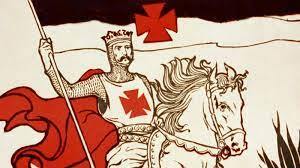1215: A Sanitized Version of the Crusades
 Episode 10 The Crusading Impulse*
Episode 10 The Crusading Impulse*
1215: Years That Changed History
Dr Dorsey Armstrong (2019)
Film Review
In this lecture, Armstrong covers the Reconquista, the first three crusades and the Knights Templar, the Knights Hospitalier and the Teutonic Knights
The Reconquista, an organized effort (between 772 and 1492) to reconquer Spain from its Muslim occupiers, was an early precursor to seven crusades between 1095 and 1221 to 1) liberate Christians in the Byzantine Empire living under Turkish occupation and 2) to free Jerusalem from Muslim control. Central Asian Turks (many of who were Muslim) had conquered the periphery of Byzantium in the early 11th century. Armstrong covers the first three crusades in this lecture.
First Crusade
Prior to the First Crusade called by Pope Urban II, there was a sizeable Christian population in Jerusalem, which had lived in harmony with Jewish and Muslim neighbors for centuries. Following Pope Urban’s call for Christian men of fighting age to “take the cross,” approximately 50,000 Europeans set off on the first Crusade in 1098. Conquering Jerusalem in 1099, the6 established four states: the counties of Trepoly and Edessa, the principality of Antioch and the kingdom of Jerusalem. Although most crusaders returned to Europe following their victory, a few remained in the Middle East to rule their new territories.
The Knights Templar
The conquest of Jerusalem led to a surge in trade between the Middle East and Europe, as well as a host of Europeans embarking on pilgrimage to Jerusalem. To protect them against robbers, Hug of Payns founded the Knights Templar (monks with permission to engage in physical violence) to protect them against highwaymen. The Knights Templar also allowed them to deposit funds in Europe they could redeem on arrival in Jerusalem. By the early 13th century, there were 200,000 Knights Templar managing the massive banking empire they had created.
A conflict with the king Philip IV of France in the 14th century led to their dissolution and confiscation of their wealth.
Knights Hospitalier
The Knights Hospitalier, also formed in the 13th century, provided hospital care for pilgrims who became ill in Jerusalem.
Teutonic Knights
A smaller group formed later in the 12th century, the Teutonic Knights helped injured crusaders. Relocating from the Middle East to Eastern Europe (where Christians were fighting non-Christian Slavs) They eventually conquered Prussia in the late 13th century.
Second Crusade
In 1144 the Saracen leader Zengi retook Edessa, leading to the Second Crusade led by the by strong Knights Templar supporter the Cistercian Abbott Bernard of Clairveau, Louis VII of France and Conrad III of Germany. After failing to scale the wall of Damascus (which was considerably south of Edessa), they retreated and headed home again.
Third Crusade
Called in in 1189, the Third Crusade was called to liberate the Holy Lands after Saracen leader Saladin recaptured Jerusalem and all but a few port cities in 1187. Led by King Philip Augustus of France, Frederick Barborosa (the Holy Roman Emperor) and King Richard the Lion-Hearted of England, it was largely a failure, except for a small group of crusaders who occupied conquered Cyprus.
*Armstrong is quite vague in explaining the uncanny ability of Pope Urban II (and of subsequent popes) to mobilize tens of thousands of men to leave their homes to risk their lives battling unknown foreign peoples. The only explanation she offers here is the law of primogeniture (under which nobles bequeathed all their land to their firstborn son), leaving subsequent sons with no income or occupation other than the church or military. Other historians have begun to look at the role of Venetian bankers (who in the 13th century controlled all finance and shipping, as well as several colonies in modern day Romania), who profited handsomely from all the crusades, especially the fourth. See Venice and the Crusades
Film can be viewed free with a library card on Kanopy.
https://www.kanopy.com/en/pukeariki/watch/video/12392969/12392990
The Most Revolutionary Act
- Stuart Jeanne Bramhall's profile
- 11 followers



